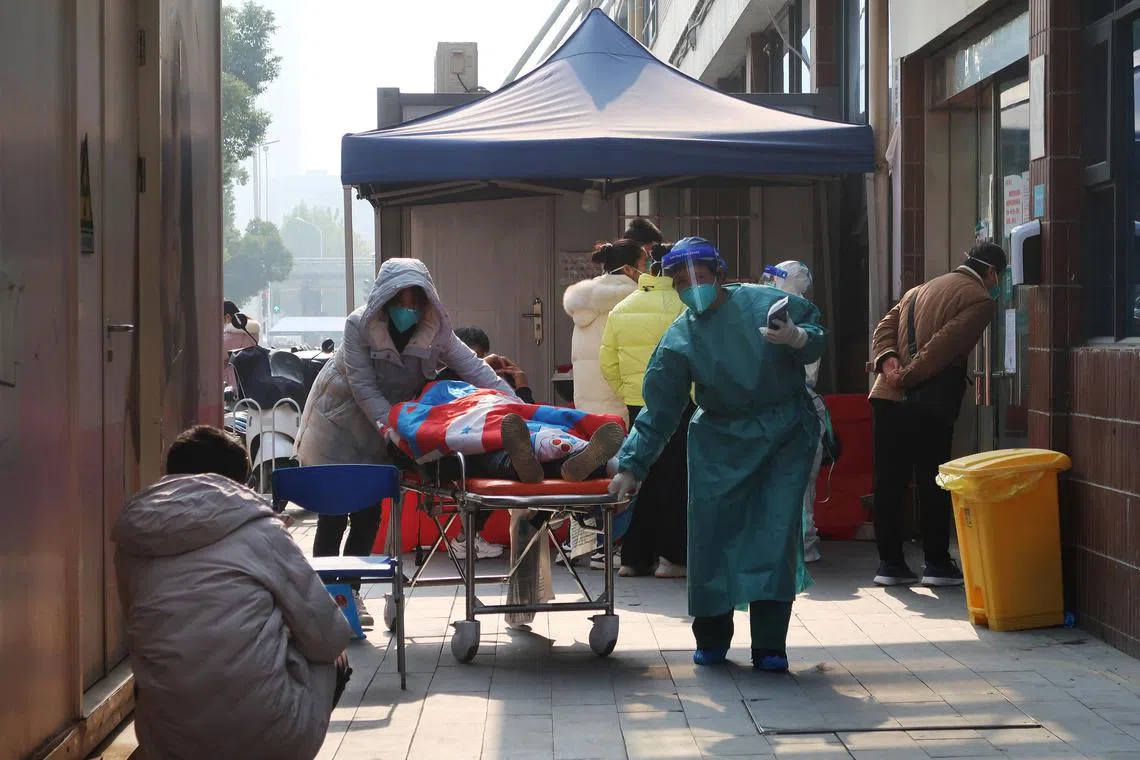Student doctor’s death reveals China’s health system is under strain
Sign up now: Get ST's newsletters delivered to your inbox

The spread of Covid-19 has seen long lines forming outside hospitals suffering from staff shortages as doctors and nurses fall ill.
PHOTO: REUTERS
Follow topic:
CHENGDU, China – Frustration at how China has handled the abrupt end to zero-Covid
A graduate student surnamed Chen, who was working at a hospital in Chengdu, south-west China, fainted on Tuesday evening then died after receiving emergency treatment, the facility said in a statement on Wednesday.
While the hospital said his death was related to a problem with his heart, social media users have speculated he was overworked and might have contracted Covid-19.
The news was one of the top trending topics on China’s Twitter-style Weibo platform on Thursday, with about 270 million reads.
The flurry of social media posts reveals deep concerns over China’s ability to handle its most significant outbreak after curbs that averted mass illness and fatalities for much of the pandemic were abruptly dismantled last week.
The accelerated spread of the virus has seen pharmacies selling out medicine, staff shortages as doctors and nurses fall ill.
Reports coming out of hospitals are reminiscent of those from the first year of the pandemic, when the United States and Europe were overwhelmed, while China was able to get its initial outbreak under control.
Three years on, the world’s most-populous nation is now having to finally make that transition as well.
Dr Sophia Qu, who works at the gastroenterology department of a public hospital in Zhongshan, in Guangdong province, said dealing with the influx of patients and trying not to get sick herself have made her “exhausted and depressed”.
She has stopped eating lunch and drinking water during workdays that can stretch for more than 10 hours, as removing her N95 mask and face shield is too risky.
“It is understandable to see a surge of patients, especially in the fever clinics, and we are trying our best to support the emergency rooms,” said Dr Qu, who is backing up colleagues who are sick due to Covid-19. “But I have a one-year-old daughter and a 70-year-old mother at home. I need to make sure I don’t pass the virus to them.”
Posts on Weibo echo Dr Qu’s predicament.
Users have said doctors at fever clinics have no time to eat or go to the toilet. Some medical students in Anhui and Jiangsu provinces protested this week for better pay, and to be allowed to return home instead of working at hospitals.
Dr Kong, a Shanghai emergency room doctor who asked not to be identified by her full name for fear of reprisal, said while the city has not seen a surge in cases so far, long hours and low pay are a consistent complaint.
After graduating with a PhD at the age of 32, she spent five years at a hospital as a trainee earning 2,000 yuan (S$388) a month, which meant she could not afford rent without family support.
Chinese officials have sought to reassure residents that there are sufficient pandemic supplies, and urged people not to go to hospitals or call emergency services hotlines unless they are severely ill.
State media, which spent most of the past three years painting Covid-19 as extremely dangerous and excoriating other nations’ approach to living with the virus, has also pivoted to downplaying its risks. BLOOMBERG

